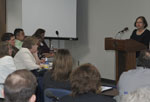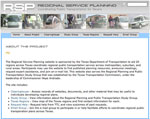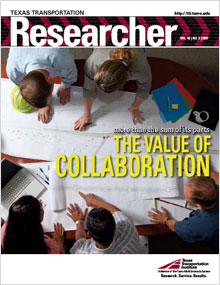Many players involved in regional public transportation coordination

What do you get when you combine public transportation and health and human service agencies in the same room with customers and citizen advocacy groups? This answer may surprise you: a coordinated transportation plan that meets the goals and objectives of all parties involved. Thanks to the Regional Planning and Public Transportation Study Group, established under guidance from Texas Transportation Commissioner Hope Andrade, regions throughout the state of Texas are doing just that.
The study group, chaired by Michael Morris, the transportation director of the North Central Texas Council of Governments, is part of a larger project aimed at reviewing current public transportation practices within regions throughout Texas and enhancing their effectiveness. The Texas Transportation Institute (TTI) provides technical support and helps to facilitate the regional coordination meetings with funding from the Texas Department of Transportation (TxDOT).

“TxDOT is a national leader in coordination planning,” says John Overman, assistant research scientist at TTI. “Although other states besides Texas have prepared these plans, the Public Transportation Division (PTN) at TxDOT advanced these planning efforts before the federal requirements were enacted.”
The Regional Planning and Public Transportation Study Group was established with the goal of assisting each of the 24 regions, as defined by the council of government boundaries, develop regional public transportation plans. Additional meetings were held in each region, with as many as 125 stakeholders attending. According to Overman, establishing a set of common goals and objectives at the beginning of the process was a key in developing a successful plan.
“With so many different agencies, there are a lot of different rules and constraints to coordination. An important benefit of this project is addressing many of these barriers and constraints, and allowing regions to better coordinate services and programs,” says Overman.
In addition to facilitating meetings, TTI also developed and maintained a website and information clearinghouse. Plans have been submitted for all regions. Several pilot programs are anticipated to be initiated in the implementation phase.
“From the outset of this initiative, the Commission has emphasized the importance of an inclusive and locally meaningful process for each region. Working together, we have made great progress and have kept the ‘public’ in public transportation planning throughout this process,” says Project Director and Texas Transportation Commissioner Assistant Shawna Russell.

